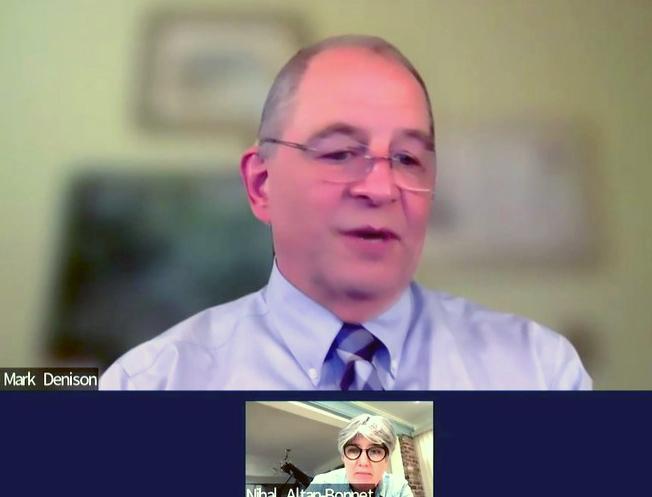Remdesivir and Covid-19
Denison Advises Getting Ahead of Antiviral Drug Resistance

Antiviral treatment options for Covid-19 are limited. So what happens if the virus develops resistance to one of these drugs?
Dr. Mark Denison of Vanderbilt University Medical Center is studying antiviral resistance to remdesivir. He discovered remdesivir’s usefulness as a coronavirus treatment before SARS-CoV-2; he and his team got to work studying possible remdesivir resistance in Covid-19 in early 2020. He presented some of this work in a recent lecture titled “Antivirals for Coronaviruses: Mechanism, Resistance and Regulation.”
Denison thinks resistance testing should be incorporated into initial drug development, rather than saved for later. He said monotherapy—widespread use of one drug—will result in resistance sooner or later, and we need to be prepared before that happens. He described the pandemic as a chess game with a twist.
“Once we decide we’re done with [Covid] and think we’ve checkmated it, it moves to a new chessboard,” he said.
Remdesivir received full FDA approval in October 2020. It is effective against many other viruses, including Ebola, Marburg and earlier coronaviruses like SARS and MERS.
Remdesivir is a nucleoside analog that mimics the structure of ATP (adenosine triphosphate), which is one critical component of RNA synthesis. Incorporation of remdesivir instead of ATP into viral RNA acts like a delayed stop sign that terminates viral RNA synthesis and virus replication.
Denison said the drug has exhibited a “profound inhibition in vitro and in animal studies,” decreasing viral titers by up to 6 logs. “It appears to be holding its own and is robust in these settings.”
Remdesivir currently is approved for use in hospitalized patients as well as mild to moderately ill outpatients who are at risk for severe disease. As the only fully approved FDA antiviral for Covid-19, the drug is widely used. And the more a virus or pathogen continues to encounter the same drug, the greater the likelihood the pathogen will develop resistance.
Denison and colleagues across several institutions worked together to study remdesivir resistance. First, they treated Covid samples in the lab with remdesivir. Any viruses that survived the treatment were allowed to replicate and were then treated again. Ultimately, Denison identified three lineages that had evolved resistance. He decided to study lineage three because it had the most interesting mutations.
Denison studied two of the lineage three mutations—S759A and V792I. Separately, each had an intermediate level of resistance to remdesivir. Together, they contributed to significant immunity by reversing the effects of remdesivir, which allowed the virus to continue to replicate.
What is the risk of SARS-CoV-2 developing remdesivir resistance in real life? Results are encouraging, according to Denison. The S759A and V792I mutations seem to be incredibly rare, with only a few hundred reported cases out of the almost 7 million recorded sequences in the GISAID database having either of these mutations.
They are “profoundly rare,” Denison said. But he cautioned that our dependence on remdesivir could lead to a “genetic bottleneck” that could theoretically create an environment where resistant viruses were more successful.
Having these mutations does seem to come with a cost to the virus. “The double mutant had a significant alteration and delay in its replication, suggesting a fitness cost,” Denison revealed. So, the original/wild type virus is more successful than the resistant virus in patients who are not treated with remdesivir, because the wild type can replicate and spread faster.
Also, remdesivir-resistant viruses were more sensitive to molnupiravir, an antiviral drug that is currently under FDA Emergency Use Authorization.

What should the research community do with this knowledge? Continue to study remdesivir resistance, Denison suggested, and expand that research to other antivirals that are going through the FDA approval process (such as molnupiravir and paxlovid).
He added that there is concern about conflicts in rules regarding what is needed for resistance testing and what can be tested once an antiviral drug receives emergency use authorization or approval for use against a pandemic virus.
According to Denison, “If it is proposed to be a resistance mutation, we can’t do experiments to prove it...but if we can’t do the experiments we can’t confirm its resistance phenotype. This has profound implications for the ability of NIH-funded investigators to identify and monitor for resistance mutations for new antivirals. Do we wait until resistance mutations arise in the real world before we begin researching them?”
Ultimately, Denison emphasized, researchers must be able to respond in a timely manner to pandemic needs.
View the archived lecture at https://videocast.nih.gov/watch=44539.
